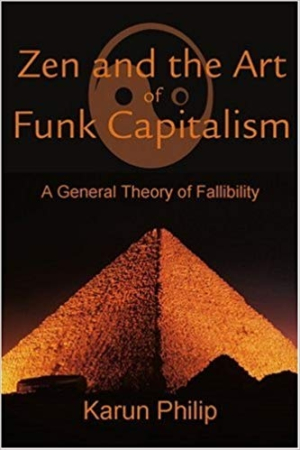Zen and the Art of Funk Capitalism
A General Theory of Fallibility
Zen and the Art of Funk Capitalism advocates for free market capitalism in an erudite, no-nonsense fashion.
Karun Philip’s philosophical economic text Zen and the Art of Funk Capitalism examines difficult concepts in a down-to-earth manner.
Exploring the fallibility of knowledge and how it relates to free market capitalism’s inability to eradicate poverty, the book’s lodestone is the work of Austrian economist F. A. Hayek. It expends most of its energy explaining how people know things and what types of knowledge lead to wealth. In essence, its argument is that free market capitalism is the optimal economic system, but that more should be done to educate the poor about what types of fallible knowledge produce wealth.
Its political stance never in doubt, the text declares “I believe in democracy, I believe in individual liberty…I believe in the power of banking and capital, used without coercion or favor, to completely eliminate poverty forever.” These are the usual talking points of free market libertarianism, and that ideology is supported throughout the book.
As a libertarian manifesto, the text is anything but basic. It is divided into several chapters composed of small essays that deal with everything from Aristotle to faith and religion in an attempt to present a holistic interpretation of how and why capitalism works. Its conclusion states that several economic measures, including the evolution of the securitization of credit and monetary competition, can eliminate most poverty, if they are coupled with increased rationalism among entrepreneurs. Such arguments are sensible and well laid out.
Most successful in presenting tough, obtuse philosophical concepts in everyday language, the book relies on real-world examples to explain why some systems succeed and others fail. It is convincing in arguing that the usual collection of “anti-poverty” measures increase poverty and do little to ameliorate the issue of generational economic failure.
But because the text is so wide-ranging, there are also some misses with the book’s arguments. When the major world religions are discussed, their theologies and histories are only addressed at a surface level. Enlightenment-esque rationalism is applied to faith rather than academic criticism, and the result is not etymologically sound. Attempts to explain faith without God interject theories of democracy into Hinduism, Buddhism, Islam, Judaism, and Christianity without success. Overreliance on Hayek’s work and failures to interact with critics of free market capitalism also weaken the text.
Zen and the Art of Funk Capitalism advocates for free market capitalism in an erudite, no-nonsense fashion.
Reviewed by
Benjamin Welton
Disclosure: This article is not an endorsement, but a review. The publisher of this book provided free copies of the book and paid a small fee to have their book reviewed by a professional reviewer. Foreword Reviews and Clarion Reviews make no guarantee that the publisher will receive a positive review. Foreword Magazine, Inc. is disclosing this in accordance with the Federal Trade Commission’s 16 CFR, Part 255.

